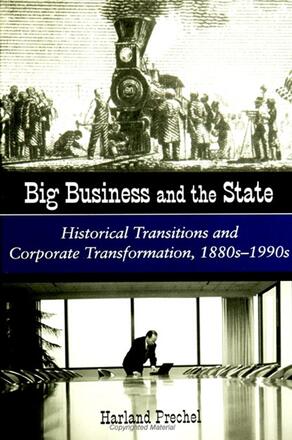
Big Business and the State
Historical Transitions and Corporate Transformations, 1880s-1990s
Alternative formats available from:
Examines the evolution of corporate form and managerial process from the 1880s to the 1990s, detailing how corporations influenced government to affect changes in response to economic transitions.
Description
In Big Business and the State Harland Prechel develops a conceptual framework that contrasts with prevailing definitions of the corporation. His analysis shows that corporate property rights and the legal basis of ownership are crucial to understanding corporate behavior. The book examines how historical transitions affected the three most significant corporate transformations in the last 110 years (1880s–1900s, 1920s–1930s, 1980s–1990s). During each period, in response to economic crisis, big business engaged in political behavior to pressure state managers to realign the institutional arrangements in which corporations were embedded. The historical multicausal method shows that economic crisis, managerial inefficiencies, dependence on external capital markets, and the political processes of redefining corporate property rights and corporate tax laws are crucial to understanding corporate transformation.
Harland Prechel is Associate Professor of Sociology at Texas A&M University, and the author of Corporate and Class Restructuring.
Reviews
"With its broad sweep, this book … will challenge and inform sociologists and business historians." — CHOICE
"This book is essential reading for sociologists interested in state theory or organizational theory. Also, the author's integration of historical case method and quantitative analysis and his ability to move easily between micro, meso, and macro levels of analysis make this book a model of sociological research that any sociologist would gain from reading." — Contemporary Sociology
"Harland Prechel, in Big Business and the State, helps move beyond embeddedness to develop an account of precisely how the relationship between corporations and the state actually shapes each of them. He synthesizes the classical organization theory concept of dependence with the foundational concept of political economy, capital, as the centerpiece of this important and potentially influential book … Prechel's empirical discussion of the difference between rationalization and efficiency is one of the best I've seen, making the book one of the sharpest critiques of efficiency theory in recent years." — Administrative Science Quarterly
"This book tackles a complex set of historical, economic, political, and sociological issues with great energy and enthusiasm. The two things I like best are the author's attention to issues of law, legislation, and the legal form of corporations, and his explicit awareness and treatment of the historical differences between nineteenth-century dynamics of economic-corporate development and the contemporary phase of economic globalization." — Wolf Heydebrand, coauthor of Rationalizing Justice: The Political Economy of Federal District Courts
"This volume takes on large and important questions. Well-written and compelling, this is good sociology. I think it has the potential to be a very important book; it's a fine piece of scholarship." — David Bills, editor of The New Modern Times: Factors Reshaping the World of Work